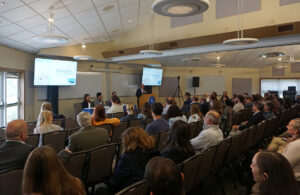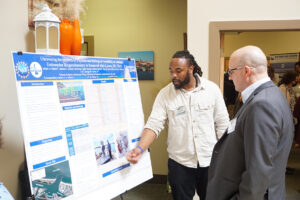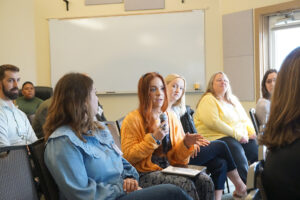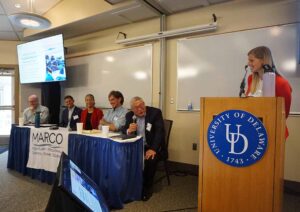
The audience at the Mid-Atlantic Ocean Forum.
Videos of the many presentations and panel talks from the Sixth Annual Mid-Atlantic Ocean Forum are now available for viewing on the MARCO website.
Held May 13-14 at the Virden Retreat Center in Lewes, Delaware, the event gathered nearly 200 participants for discussions on topics including climate-ocean action, sustainable ocean economies, ocean conservation and healthy ecosystems, marine spatial planning, and much more. A third day featured a guided tour of the Vessel Traffic Information System tower operated by the Pilots’ Association for the Bay and River Delaware.
“We host this convening every year to bring people and places and prosperity into planning for one ecosystem that we all share, that includes humans and the environment,” said MARCO Executive Director Avalon Bristow, kicking off the Forum. “We have a lot of work to do over the next two days and I’m very excited to take what we learn today and tomorrow back to the Mid-Atlantic Ocean Planning Committee’s many work groups and collaborative efforts.”
Day One
Above: Opening remarks and the first panel discussion on the first day of the Forum.
Following brief introductory remarks, the Forum launched with two sessions dedicated to marine spatial planning and data sharing in the Mid-Atlantic. Six panelists covered topics including improving data governance, informing fisheries management response to climate change, and map products that are available or under development to assist with offshore wind planning and more accurately depict marine life distributions.

A student presents his research during the Forum poster session.
At lunchtime, roughly two dozen students and young professionals shared their research in a poster session coordinated by the Mid-Atlantic Regional Association Coastal and Ocean Observing System (MARACOOS) and MARCO.
The Forum then transitioned to a series of breakout sessions facilitated by the Raben Group that sparked in-depth conversations on ocean justice. Attendees chose to join any of three interactive talks centered on identifying underserved communities in regional ocean planning, harnessing effective communication for ocean justice, or broadening equitable access to public lands and waters.
The day concluded with a “Coastal Communities and Habitat” session that included an initial presentation on tools and data for improving aquaculture siting. Two subsequent presentations featured research on what sea-level rise will mean for the region’s blue carbon stocks and how effective salt marshes are at capturing atmospheric carbon.
Day Two
Above: Presentation by Kaitlyn Dykes on the Lewes area’s maritime history followed by the first panel discussion of the Forum’s second day.
Leading off the second day, Kaitlyn Dykes, a historian with the Delaware Department of Natural Resources and Environmental Control, cast the relevance of the Forum in a new light with a lesson on the rich maritime history of Cape Henlopen. Dykes fascinated the audience with stories of how the area’s coastal terrain, waters and marine life influenced the life and times of Native Americans, European settlers and explorers like Henry Hudson, and the outcome of World War II.
“When we talk about history and the environment, the two seem very disparate a lot of the time,” Dykes said. “But it’s very important, especially for us as historians, to remember that it is often the location that dictates the history that happens there.”

A Forum attendee asks a panel member a question.
The Forum discussions then steered back to the scientific with a panel on changes in marine environments. Presentations covered spatial data needs and projects underway to related to ocean acidification monitoring, and scientific efforts underway to track ocean conditions along its surface and at its deepest reaches in the region.
Attendees were once again free to participate in one of three afternoon breakout sessions, this time dedicated to employing community-based social marketing to thwart marine debris, understanding community needs and priorities regarding ocean acidification, and marine sanctuaries designation efforts in the Mid-Atlantic.
Finally, a pair of sessions informed attendees of the latest scientific research and policy challenges related to the Mid-Atlantic seafloor. Of the six expert presentations, the first three centered on meeting the region’s demand for sand resources while protecting ecosystems, while the latter explored the importance of the seafloor as a marine life habitat.
Closing Discussions
Above: The closing stakeholder panel at the Forum.
Mid-Atlantic Ocean Planning Committee Chair Kristi Lieske, of the Delaware Department of Natural Resources and Environmental Control, moderated a final stakeholder panel that reflected upon the lessons learned over the two days. She said she was struck by how intertwined the forward-thinking science presented was with the region’s past and “the power of place.”

The closing stakeholder panel.
“I’m so excited to get this sense of the Mid-Atlantic dictating how we are contributing to these moments of time and history,” Lieske said. “Even though we’re collecting data a lot of the times for the now, and we’re trying to solve problems that we have right now, we are seeing that everybody is using this data and these stories from way back when.”
Alan Lee, owner of New Jersey-based Mushin Sportfishing and chair of the Hudson Canyon National Marine Sanctuary Advisory Council, said he was struck by the wealth of talent from many walks of life that had contributed to the Forum dialogue. He encouraged the Forum organizers to continue building on this strength, particularly by bringing more commercial fishing industry and youth voices to the table for future ocean planning meetings.
“While many of us have been in our respective professional worlds for years, decades, it’s the students that are going to carry this work forward,” Lee said. “We’re not just planning for today, of course, we’re planning for the future.”
